| Reviews & Columns |
|
Reviews DVD TV on DVD Blu-ray 4K UHD International DVDs In Theaters Reviews by Studio Video Games Features Collector Series DVDs Easter Egg Database Interviews DVD Talk Radio Feature Articles Columns Anime Talk DVD Savant Horror DVDs The M.O.D. Squad Art House HD Talk Silent DVD
|
DVD Talk Forum |
|
|
| Resources |
|
DVD Price Search Customer Service #'s RCE Info Links |
|
Columns
|
|
|
Clouds of Sils Maria: The Criterion Collection
The Criterion Collection // R // June 28, 2016
List Price: $39.95 [Buy now and save at Amazon]
The Film:
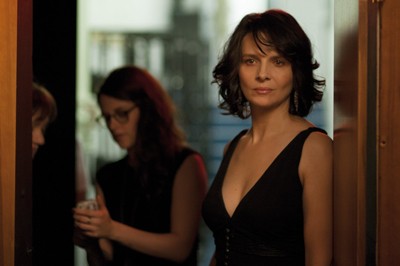 Over the past couple of years, a handful of films have tackled the idea of an aging celebrity's legacy and their intrinsic, often obligatory pull to the form of art that brought them their stardom. From an ex-superhero film star's attempt at a stage play in Birdman to a retired composer's offer to conduct a final performance for royalty in Youth, these stories have reached into the psyches of people whose creative pursuits have given them decades of unique context involving the work they've produced, as well as how their fields have evolved around their participation. Maneuvering between these pieces of work much like the natural phenomenon in its title, Olivier Assayas' Clouds of Sils Maria tackles the notion in a similar manner, thrusting an aging actress into the mature opposite leading role from the production that helped make her a star in her youth. Assayas draws nuanced performances out of his pair of leading ladies as they explore the actress' evolving perception of a role that directly confronts her age, though these keyhole glimpses into her change cut away much sooner than they should throughout.
Over the past couple of years, a handful of films have tackled the idea of an aging celebrity's legacy and their intrinsic, often obligatory pull to the form of art that brought them their stardom. From an ex-superhero film star's attempt at a stage play in Birdman to a retired composer's offer to conduct a final performance for royalty in Youth, these stories have reached into the psyches of people whose creative pursuits have given them decades of unique context involving the work they've produced, as well as how their fields have evolved around their participation. Maneuvering between these pieces of work much like the natural phenomenon in its title, Olivier Assayas' Clouds of Sils Maria tackles the notion in a similar manner, thrusting an aging actress into the mature opposite leading role from the production that helped make her a star in her youth. Assayas draws nuanced performances out of his pair of leading ladies as they explore the actress' evolving perception of a role that directly confronts her age, though these keyhole glimpses into her change cut away much sooner than they should throughout.
Juliette Binoche is Maria Enders, a film and stage icon in her forties who owes the bulk of her success to a production from her youth, Maloja Snake, a tale of the intense lesbian relationship between a young, confident assistant -- Sigrid, whom Maria played -- and her amenable boss, Helena. As she's traveling to Switzerland to accept an award on behalf of the writer and director of Maloja Snake, Maria leans from her personal assistant, Valentine (Kristen Stewart), of his unexpected death, casting a shadow over the event and impacting her train of thought. Out of the tragedy, however, emerges an opportunity: Maria is offered the chance to embody the role of Helena in a stage revival, a means to which she might be able to pay homage to the writer-director. By accepting the offer, she'll also have to examine how she's transitioned from the young assistant she once played to the matured character, as well as taking a close look at the starlet (Chloe Moretz) who will now play Sigrid, which throws her into an analytical frame of mind that disrupts her personal relationships.
Modest dramatic happenings upon a train begin a series of progressive vignettes centered on Maria's absorption with her age and legacy, many of which jump around and fade to black at inopportune times in Clouds of Sils Maria ... at points where more insight into her reactions would've been welcome. These keyhole glimpses into her life, into how she shoulders the burden of the director's death and the substance of her own accomplishments up until that point, do form into a cohesive portrait of the woman's current state of turmoil, navigated by Juliette Binoche's reliably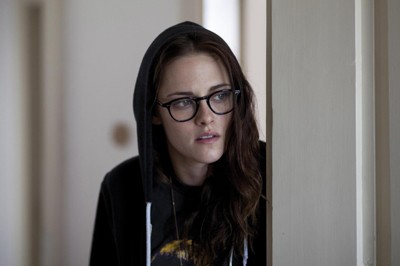 sober, reflective persona. Olivier Assayas seems devoted to keeping the audience at a distance from the layers of the actress' personality, though, instead more concerned with her dissection of where she's arrived in her career and why she's no longer the woman who once played Sigrid. The reason for this vagueness rests in her struggle to pin down her own identity, and while that's an admirable endeavor when filtered through Binoche's attraction to characters with similar internal conflicts -- a war photog in 1000 Times Good Night; a painter in Words & Pictures -- Maria lacks the substantial traits that deepen those intentions.
sober, reflective persona. Olivier Assayas seems devoted to keeping the audience at a distance from the layers of the actress' personality, though, instead more concerned with her dissection of where she's arrived in her career and why she's no longer the woman who once played Sigrid. The reason for this vagueness rests in her struggle to pin down her own identity, and while that's an admirable endeavor when filtered through Binoche's attraction to characters with similar internal conflicts -- a war photog in 1000 Times Good Night; a painter in Words & Pictures -- Maria lacks the substantial traits that deepen those intentions.
Interestingly enough, her assistant Valentine actually does possess that kind of underlying substance, and the way she handles Maria's gradual and unpretentious downward spiral becomes one of the chief reasons to experience Clouds of Sils Maria. Kristen Stewart ends up being a sublime match for Valentine: she's an optimist and enthusiast who's burdened with her boss' old-school cynicism, and she's someone who sees the creative risks that artists take in mass-market productions and isn't afraid to admire celebrities younger than her with polarizing personalities. The actress, once the starlet of Twilight who's slowly come into her own through other indie projects like Welcome to the Rileys and Camp X-Ray, brings restrained, simmering exasperation to the personal assistant responsible for keeping Maria afloat. Small, seemingly inconsequential glimpses at their everyday activities, such as when Valentine runs through a series of appearance and performance opportunities for Maria to consider, are made intriguing by the kind of personality both Assayas and Stewart have managed to craft with the assistant.
Early on, amid Maria's somber reflection on the director and her insecurity over playing the older role in the play that sparked her career, Clouds of Sils Maria feels somewhat aimless, reveling in the back-and-forth between the actress and her personal assistant for a day-by-day study of their lives. It's only once Maria and Valentine begin reading the lines of Maloja Snake together -- and once they start to analyze the temperament of Chloe Moretz' Jo-Ann Ellis as her "replacement" -- that the film discovers the reason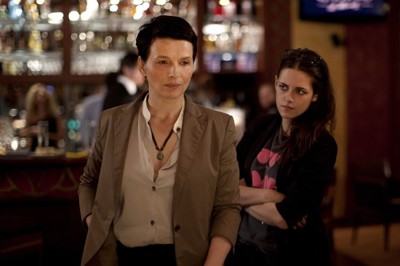 it's meant to exist, drawing indirect, uniquely-deciphered parallels between the boss-assistant relationships in real life and in the language of the play. Their lengthy rehearsals and discussions over interpretations of the play, and of other films, performances, and actors, allow organic clashes of opinions to emerge between them, propelling the film through the gorgeously photographed stretches of land through which they take lengthy hikes. As the relationship in the play begins to boil, so too does the relationship between Maria and Valentine, only at a different temperature.
it's meant to exist, drawing indirect, uniquely-deciphered parallels between the boss-assistant relationships in real life and in the language of the play. Their lengthy rehearsals and discussions over interpretations of the play, and of other films, performances, and actors, allow organic clashes of opinions to emerge between them, propelling the film through the gorgeously photographed stretches of land through which they take lengthy hikes. As the relationship in the play begins to boil, so too does the relationship between Maria and Valentine, only at a different temperature.
Interrupting his story with hypnotic driving sequence through the Swiss mountains, extended footage from a Maloja Snake doc, and a deliberately hokey movie-within-a-movie, Olivier Assayas artfully slipstreams through topics of evolving careers, deceptive appearances, and coming to grips with age in Clouds of Sils Maria. There's a lot to get absorbed in with Maria's internal conflicts, though the director's fascination with keeping certain things undisclosed-- punctuated with those many fades to black at interesting points in scenes or conversations -- continues to be a source of frustration all the way until the fog comes rolling in at the end. Assayas so wants his audience to empathize with the aging actress and her push-and-pull relationship with her name-making play, and her journey through self-realization can certainly spark a discussion about one's own cathartic understanding of youth and experience. That said, Clouds of Sils Maria constantly turns away just as its more profound inclinations are about to emerge, and it's a testament to Assayas' general craftsmanship that one wishes it wouldn't do that.
The Blu-ray:
The Criterion Collection have released Olivier Assayas' Clouds of Sils Maria as spine #822 in their collection, arriving in their familiar clear-case design. The front artwork largely carries over onto the disc design, with the silhouettes of faces visible in blue wavy patterns. Inside, a foldout Booklet contains information about the transfer, cast credits and an essay from Molly Haskell entitled "iClouds of Sils Maria".
Video and Audio:
For the most part, Olivier Assayas and Only Loves Left Alive cinematographer Yorick Le Saux operate around a cooler, dimmer blueish-hued color palette, deviating in outdoor sequences and the insistently warm lighting of restaurants. This 2K-sourced AVC digital transfer from The Criterion Collection of the 2.35:1-framed film does an impeccable job of coaxing the restrained flesh tones from the cooler atmosphere, while allowing the details in close ups -- strands of hair, creases around eyes, folds in fabric -- to emerge with crisp clarity. Some heavier noise emerges in a few extreme low-light sequences that give the image a bulkier appearance, while a few black levels err dangerously close to crushing out details in their dimness, again during darker sequences. These are few and far between, however, and they're greatly overshadowed by both the interior and exterior beauty of the photography, especially once Binoche and Stewart hit the Swiss hiking trails and all the verdant shades and textures engulf them.
The 5.1 DTS-HD Master Audio track revolves almost entirely around vocal clarity and very mild suround atmosphere, and this surround presentation sustains an exceptionally clear, distortion-free presence to every articulation and mild sound effect that emerges. Things like the tossing of books and the slam of a purse on a windshield are the minor effects that come about, and they're as clear and responsive as they need to be against the natural separation across the front channels. The dialogue remains delightfully sharp and aware of midline bass levels, never sounding raspy during several theatrical yelling sequences. Surround activity beyond the resonant music is rare, but a few sequences involving thunder and driving send some effects to the rear channels, which are clear and appropriately balanced with the front end. It's not a complicated track, but the digital evenhandedness makes it delightful to hear.
Special Features:
Olivier Assayas: Beyond Time (37:46, 16x9 HD):
This lengthy chat with the director, speaking in English, matches the quality of Criterion's previous releases: elaborative and paced deliberately, properly spaced out with clips from Clouds of Sils Maria an other films. He discusses working with Juliette Binoche and his writing process, the things that go untouched by the passage of time, and the parallels between his film and Ingmar Bergman's Persona. He then gets to the meat of the film itself, discussing how he wanted the feel of picking up in the middle of a story during the opening train sequence and how Assayas landed on Kristen Stewart as the supporting actress, as well as the chronology of the shooting schedule. It's an interesting chat that sports that nice flow Criterion has become so good at from general discussion about the filmmakers' origins to the nitty-gritty about the focal film itself.
Juliette Binoche and Kristen Stewart: Fiction and Reality in Clouds of Sils Maria (37:46, 16x9 HD):
The interview time with Binoche and Stewart is chopped up and edited together into somewhat correlating topics, delving into how they got started with Assayas with the film's conception, the origin and presence of their characters, and eventually into the experienced all three actresses have shared in their places among pop-culture. Binoche also discusses her characters weight and the revealing swimming scene, while they both touch on their deeper outlooks on the themes touched upon in the characters, as well as strong female figures in general and discussing the freer-form nature of Assayas' process.
The Criterion Collection have also included the short 1923 documentary Cloud Phenomena of Maloja (10:23, 16x9 HD), from which footage was taken and used in Clouds of Sils Maria, as well as a somewhat deceptively-cut Theatrical Trailer (2:09, 16x9 HD).
Final Thoughts:
Olivier Assayas wraps up a meditative premise with decent, overly enigmatic drama in Clouds of Sils Maria, his tale of an aging actress who ruminates on her career as she prepares to play the lead character opposite the one that made her a star in her youth. Juliette Binoche delivers a predictably absorbing performance as the actress, but Kristen Stewart manages to steal the show as her assistant, Valentine, who embodies authentic enthusiasm and optimistic artistic interpretation in the face of cynicism and jealousy from her boss. While incredibly well-performed, meticulously crafted, and ultimately thought-provoking, Assayas also wishes to keep certain elements of Maria's life behind closed doors, in the midst of overly self-assured skips through time, which loses some of the character-driven film's potency along the way. The Criterion Collection's presentation looks and sounds great, and comes with a predictably fine collection of interviews with the director and his actresses. Strongly Recommended.
Thomas Spurlin, Staff Reviewer -- DVDTalk Reviews | Personal Blog/Site
 Over the past couple of years, a handful of films have tackled the idea of an aging celebrity's legacy and their intrinsic, often obligatory pull to the form of art that brought them their stardom. From an ex-superhero film star's attempt at a stage play in Birdman to a retired composer's offer to conduct a final performance for royalty in Youth, these stories have reached into the psyches of people whose creative pursuits have given them decades of unique context involving the work they've produced, as well as how their fields have evolved around their participation. Maneuvering between these pieces of work much like the natural phenomenon in its title, Olivier Assayas' Clouds of Sils Maria tackles the notion in a similar manner, thrusting an aging actress into the mature opposite leading role from the production that helped make her a star in her youth. Assayas draws nuanced performances out of his pair of leading ladies as they explore the actress' evolving perception of a role that directly confronts her age, though these keyhole glimpses into her change cut away much sooner than they should throughout.
Over the past couple of years, a handful of films have tackled the idea of an aging celebrity's legacy and their intrinsic, often obligatory pull to the form of art that brought them their stardom. From an ex-superhero film star's attempt at a stage play in Birdman to a retired composer's offer to conduct a final performance for royalty in Youth, these stories have reached into the psyches of people whose creative pursuits have given them decades of unique context involving the work they've produced, as well as how their fields have evolved around their participation. Maneuvering between these pieces of work much like the natural phenomenon in its title, Olivier Assayas' Clouds of Sils Maria tackles the notion in a similar manner, thrusting an aging actress into the mature opposite leading role from the production that helped make her a star in her youth. Assayas draws nuanced performances out of his pair of leading ladies as they explore the actress' evolving perception of a role that directly confronts her age, though these keyhole glimpses into her change cut away much sooner than they should throughout. Juliette Binoche is Maria Enders, a film and stage icon in her forties who owes the bulk of her success to a production from her youth, Maloja Snake, a tale of the intense lesbian relationship between a young, confident assistant -- Sigrid, whom Maria played -- and her amenable boss, Helena. As she's traveling to Switzerland to accept an award on behalf of the writer and director of Maloja Snake, Maria leans from her personal assistant, Valentine (Kristen Stewart), of his unexpected death, casting a shadow over the event and impacting her train of thought. Out of the tragedy, however, emerges an opportunity: Maria is offered the chance to embody the role of Helena in a stage revival, a means to which she might be able to pay homage to the writer-director. By accepting the offer, she'll also have to examine how she's transitioned from the young assistant she once played to the matured character, as well as taking a close look at the starlet (Chloe Moretz) who will now play Sigrid, which throws her into an analytical frame of mind that disrupts her personal relationships.
Modest dramatic happenings upon a train begin a series of progressive vignettes centered on Maria's absorption with her age and legacy, many of which jump around and fade to black at inopportune times in Clouds of Sils Maria ... at points where more insight into her reactions would've been welcome. These keyhole glimpses into her life, into how she shoulders the burden of the director's death and the substance of her own accomplishments up until that point, do form into a cohesive portrait of the woman's current state of turmoil, navigated by Juliette Binoche's reliably
 sober, reflective persona. Olivier Assayas seems devoted to keeping the audience at a distance from the layers of the actress' personality, though, instead more concerned with her dissection of where she's arrived in her career and why she's no longer the woman who once played Sigrid. The reason for this vagueness rests in her struggle to pin down her own identity, and while that's an admirable endeavor when filtered through Binoche's attraction to characters with similar internal conflicts -- a war photog in 1000 Times Good Night; a painter in Words & Pictures -- Maria lacks the substantial traits that deepen those intentions.
sober, reflective persona. Olivier Assayas seems devoted to keeping the audience at a distance from the layers of the actress' personality, though, instead more concerned with her dissection of where she's arrived in her career and why she's no longer the woman who once played Sigrid. The reason for this vagueness rests in her struggle to pin down her own identity, and while that's an admirable endeavor when filtered through Binoche's attraction to characters with similar internal conflicts -- a war photog in 1000 Times Good Night; a painter in Words & Pictures -- Maria lacks the substantial traits that deepen those intentions. Interestingly enough, her assistant Valentine actually does possess that kind of underlying substance, and the way she handles Maria's gradual and unpretentious downward spiral becomes one of the chief reasons to experience Clouds of Sils Maria. Kristen Stewart ends up being a sublime match for Valentine: she's an optimist and enthusiast who's burdened with her boss' old-school cynicism, and she's someone who sees the creative risks that artists take in mass-market productions and isn't afraid to admire celebrities younger than her with polarizing personalities. The actress, once the starlet of Twilight who's slowly come into her own through other indie projects like Welcome to the Rileys and Camp X-Ray, brings restrained, simmering exasperation to the personal assistant responsible for keeping Maria afloat. Small, seemingly inconsequential glimpses at their everyday activities, such as when Valentine runs through a series of appearance and performance opportunities for Maria to consider, are made intriguing by the kind of personality both Assayas and Stewart have managed to craft with the assistant.
Early on, amid Maria's somber reflection on the director and her insecurity over playing the older role in the play that sparked her career, Clouds of Sils Maria feels somewhat aimless, reveling in the back-and-forth between the actress and her personal assistant for a day-by-day study of their lives. It's only once Maria and Valentine begin reading the lines of Maloja Snake together -- and once they start to analyze the temperament of Chloe Moretz' Jo-Ann Ellis as her "replacement" -- that the film discovers the reason
 it's meant to exist, drawing indirect, uniquely-deciphered parallels between the boss-assistant relationships in real life and in the language of the play. Their lengthy rehearsals and discussions over interpretations of the play, and of other films, performances, and actors, allow organic clashes of opinions to emerge between them, propelling the film through the gorgeously photographed stretches of land through which they take lengthy hikes. As the relationship in the play begins to boil, so too does the relationship between Maria and Valentine, only at a different temperature.
it's meant to exist, drawing indirect, uniquely-deciphered parallels between the boss-assistant relationships in real life and in the language of the play. Their lengthy rehearsals and discussions over interpretations of the play, and of other films, performances, and actors, allow organic clashes of opinions to emerge between them, propelling the film through the gorgeously photographed stretches of land through which they take lengthy hikes. As the relationship in the play begins to boil, so too does the relationship between Maria and Valentine, only at a different temperature. Interrupting his story with hypnotic driving sequence through the Swiss mountains, extended footage from a Maloja Snake doc, and a deliberately hokey movie-within-a-movie, Olivier Assayas artfully slipstreams through topics of evolving careers, deceptive appearances, and coming to grips with age in Clouds of Sils Maria. There's a lot to get absorbed in with Maria's internal conflicts, though the director's fascination with keeping certain things undisclosed-- punctuated with those many fades to black at interesting points in scenes or conversations -- continues to be a source of frustration all the way until the fog comes rolling in at the end. Assayas so wants his audience to empathize with the aging actress and her push-and-pull relationship with her name-making play, and her journey through self-realization can certainly spark a discussion about one's own cathartic understanding of youth and experience. That said, Clouds of Sils Maria constantly turns away just as its more profound inclinations are about to emerge, and it's a testament to Assayas' general craftsmanship that one wishes it wouldn't do that.
The Blu-ray:
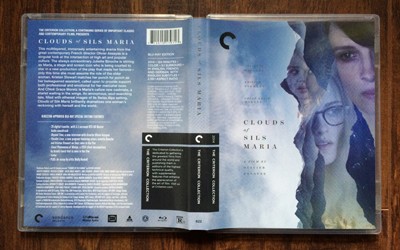 | 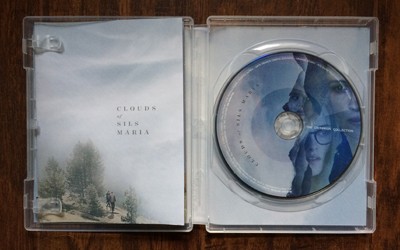 |
The Criterion Collection have released Olivier Assayas' Clouds of Sils Maria as spine #822 in their collection, arriving in their familiar clear-case design. The front artwork largely carries over onto the disc design, with the silhouettes of faces visible in blue wavy patterns. Inside, a foldout Booklet contains information about the transfer, cast credits and an essay from Molly Haskell entitled "iClouds of Sils Maria".
Video and Audio:
For the most part, Olivier Assayas and Only Loves Left Alive cinematographer Yorick Le Saux operate around a cooler, dimmer blueish-hued color palette, deviating in outdoor sequences and the insistently warm lighting of restaurants. This 2K-sourced AVC digital transfer from The Criterion Collection of the 2.35:1-framed film does an impeccable job of coaxing the restrained flesh tones from the cooler atmosphere, while allowing the details in close ups -- strands of hair, creases around eyes, folds in fabric -- to emerge with crisp clarity. Some heavier noise emerges in a few extreme low-light sequences that give the image a bulkier appearance, while a few black levels err dangerously close to crushing out details in their dimness, again during darker sequences. These are few and far between, however, and they're greatly overshadowed by both the interior and exterior beauty of the photography, especially once Binoche and Stewart hit the Swiss hiking trails and all the verdant shades and textures engulf them.
The 5.1 DTS-HD Master Audio track revolves almost entirely around vocal clarity and very mild suround atmosphere, and this surround presentation sustains an exceptionally clear, distortion-free presence to every articulation and mild sound effect that emerges. Things like the tossing of books and the slam of a purse on a windshield are the minor effects that come about, and they're as clear and responsive as they need to be against the natural separation across the front channels. The dialogue remains delightfully sharp and aware of midline bass levels, never sounding raspy during several theatrical yelling sequences. Surround activity beyond the resonant music is rare, but a few sequences involving thunder and driving send some effects to the rear channels, which are clear and appropriately balanced with the front end. It's not a complicated track, but the digital evenhandedness makes it delightful to hear.
Special Features:
Olivier Assayas: Beyond Time (37:46, 16x9 HD):
This lengthy chat with the director, speaking in English, matches the quality of Criterion's previous releases: elaborative and paced deliberately, properly spaced out with clips from Clouds of Sils Maria an other films. He discusses working with Juliette Binoche and his writing process, the things that go untouched by the passage of time, and the parallels between his film and Ingmar Bergman's Persona. He then gets to the meat of the film itself, discussing how he wanted the feel of picking up in the middle of a story during the opening train sequence and how Assayas landed on Kristen Stewart as the supporting actress, as well as the chronology of the shooting schedule. It's an interesting chat that sports that nice flow Criterion has become so good at from general discussion about the filmmakers' origins to the nitty-gritty about the focal film itself.
Juliette Binoche and Kristen Stewart: Fiction and Reality in Clouds of Sils Maria (37:46, 16x9 HD):
The interview time with Binoche and Stewart is chopped up and edited together into somewhat correlating topics, delving into how they got started with Assayas with the film's conception, the origin and presence of their characters, and eventually into the experienced all three actresses have shared in their places among pop-culture. Binoche also discusses her characters weight and the revealing swimming scene, while they both touch on their deeper outlooks on the themes touched upon in the characters, as well as strong female figures in general and discussing the freer-form nature of Assayas' process.
The Criterion Collection have also included the short 1923 documentary Cloud Phenomena of Maloja (10:23, 16x9 HD), from which footage was taken and used in Clouds of Sils Maria, as well as a somewhat deceptively-cut Theatrical Trailer (2:09, 16x9 HD).
Final Thoughts:
Olivier Assayas wraps up a meditative premise with decent, overly enigmatic drama in Clouds of Sils Maria, his tale of an aging actress who ruminates on her career as she prepares to play the lead character opposite the one that made her a star in her youth. Juliette Binoche delivers a predictably absorbing performance as the actress, but Kristen Stewart manages to steal the show as her assistant, Valentine, who embodies authentic enthusiasm and optimistic artistic interpretation in the face of cynicism and jealousy from her boss. While incredibly well-performed, meticulously crafted, and ultimately thought-provoking, Assayas also wishes to keep certain elements of Maria's life behind closed doors, in the midst of overly self-assured skips through time, which loses some of the character-driven film's potency along the way. The Criterion Collection's presentation looks and sounds great, and comes with a predictably fine collection of interviews with the director and his actresses. Strongly Recommended.
|
| Popular Reviews |
| Sponsored Links |
|
|
| Sponsored Links |
|
|
| Release List | Reviews | Shop | Newsletter | Forum | DVD Giveaways | Blu-Ray | Advertise |
|
Copyright 2024 DVDTalk.com All Rights Reserved. Legal Info, Privacy Policy, Terms of Use,
Manage Preferences,
Your Privacy Choices | |||||||













